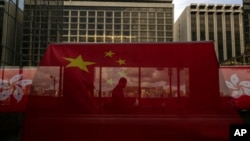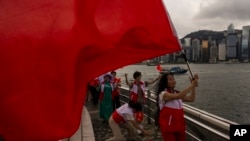HONG KONG - Punish Mee, an app that listed so-called yellow businesses so Hong Kong consumers could support the pro-democracy movement while shopping, went dark Friday as its social media accounts and their content disappeared.
Yellow became a symbol of political resistance after 2014 pro-democracy demonstrators in Hong Kong used yellow umbrellas to block the pepper spray and tear gas used by police. Control of the onetime British territory was transferred to China in 1997, and Beijing has tightened its grip on the city since.
Earlier in the week, authorities arrested five people identified by Hong Kong media as connected to the app, according to the Hong Kong Free Press and the Hong Kong Standard.
Police did not confirm the identities or party affiliations of those arrested. Local Hong Kong media identified the people and linked them to Demosisto.
Those arrests came after police issued arrest warrants for eight prominent pro-democracy activists now living overseas, including Nathan Law, a Demosisto party founder self-exiled in the U.K., and offered bounties of $128,000, or HK$1 million, for information leading to any arrest.
Demosisto, founded in 2016 with the goal of achieving autonomy and self-determination for Hong Kong, disbanded June 30, 2020, hours after China imposed the sweeping and vaguely worded National Security Law in Hong Kong.
The South China Morning Post reported the funds raised through the now-dark app were to support Law’s activities.
Punish Mee’s disappearance came as the National Security Department of the Hong Kong Police appears to be gearing up to crack down on yellow stores, according to a report in Hong Kong’s oldest and second-largest newspaper.
The Chinese language newspaper Sing Tao Daily quoted a source Wednesday as saying that the police were following up on the five arrests with crackdowns on the yellow economy to snap the capital chain used to fund the so-called dissidents overseas.
Hong Kong’s Sing Tao has often said that it is not "controlled nor influenced" by the ruling Chinese Communist Party. The U.S. Justice Department has required that its U.S. subsidiary register as a foreign agent.
The main backers of the yellow economy are restaurants, snack shops and other small businesses. Many were known to display pro-democracy paraphernalia and slogans or support demonstrators during the 2019 protests triggered by a bill that proposed extraditing Hong Kongers to China for trial in some circumstance.
Since the 2019 protests, Hong Kong consumers who support the pro-democracy movement would often patronize the yellow businesses and boycott “red stores" that are pro-Beijing and support the police.
Punish Mee, launched in 2020, echoed other online offerings that appeared during protests to advise consumers if an enterprise supported the pro-democracy movement or the Beijing-approved government. Many businesses that supported the government were defaced or damaged. Other apps mapped the location of protests and police.
Punish Mee disappeared from the online Android and Apple app stores in Hong Kong on Friday, according to the Hong Kong Free Press, which reported that for users who had the app installed, a pop-up message, “Server busy, try again” when they attempted to use it. It is not known if Hong Kong authorities or people affiliated with the app took it offline.
A Punish Mee-recommended enterprise announced Thursday that it was closing. The Hong Kong Free Press reported that many owners of businesses identified by the app were wary of possible repercussions.
Ms. Ding, a Hong Kong resident who requested anonymity to avoid attracting attention from Hong Kong authorities, told VOA she shopped at yellow stores.
“There are very few parades and demonstrations in Hong Kong now, the usual means of making demands,” she said. “We have to support people with the same ideas through relatively indirect means, such as consumption."
Ms. Ding said Punish Mee “listed almost all the yellow stores. If it (the Hong Kong government) really wants to take action, it may take action against the hundreds of stores listed by the app. Or maybe it only needs to take actions against a few stores to deter others from labeling themselves as yellow stores. It is not surprising.”
She continued to say, “In the past, these stores would open some special pages (on social media) and use these platforms to discuss current affairs. Maybe they will shut up in the future. As for fundraising, everyone will see it as a taboo."
Baggio Leung, a former member of the Hong Kong Legislative Council, said the definition of the "supporting anti-China chaos in Hong Kong" law cited in the arrests is vague.
“This incident is not only aimed at the yellow economic circle but gradually oppresses … Hong Kong people," he said.
Leung said that under the Hong Kong National Security Law, the current yellow store owners want something other than profits.
"If you continue operating the (yellow) business now, there is unlikely any benefit,” he said. “If you persist, there must be only one reason: to adhere to your political belief. Some yellow stores that closed in Hong Kong have opened in overseas regions such as the U.K. The pandemic forced some businesses to close. Some people keep their businesses open as long as they can. But everyone understands that the living space is getting smaller and smaller under the current political environment in Hong Kong."





